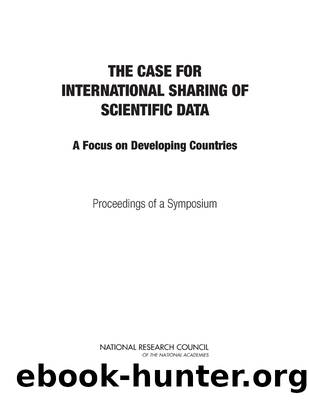The Case for International Sharing of Scientific Data: A Focus on Developing Countries: Proceedings of a Symposium by Kathie Bailey Mathae

Author:Kathie Bailey Mathae
Language: eng
Format: epub
Tags: ebook, book
Publisher: The National Academies Press
Published: 2014-07-23T00:00:00+00:00
We also want to know about all the children around the world who did the IPY-wide experiments on polar days. We want to know all the students who were exposed to IPY at exhibits around the world. We want to know the number of cities and museums that had IPY events. We want to know about students who went to summer schools and gave their first poster or gave their first presentation, and we want to know the number of young scientists who have joined this new association of polar scientists.
This is just a glimpse of the IPY datasets, but you see the variety and complexity. It is literally true that, among the ICSU unions, no union could identify a science that was not included in IPY. This is its strength, but this is also its challenge from a data management point of view. Think of our data management systems on two axes: one international and the other interdisciplinary. The WMO and the World Data Centers are examples of international data activities. The WMO has meteorological and hydrological data, but it is actually relatively narrow in an interdisciplinary perspective. The World Data Centers are even more so. Canada built a relatively good interdisciplinary data portal for IPY. It does not cover satellite data or public health data, but it covers much of the range of what we would call earth science data. Canada did a very good job with interdisciplinary access.
IPY is thus both highly interdisciplinary and highly international. IPY is leading in this regard and I think this is where science is going to be in the future. It is going to be widely interdisciplinary and widely international, but we also expose the gaps. There really are no existing services and that is an institutional or international infrastructural gap.
We have projects that have good data plans and others that have adequate data plans. I define a good data plan as those projects that have a plan for both storing and sharing the data. Thirty-five of the projects have good data plans. Another 30 of them have adequate data plans. That means they know where they are going to store their data, but they do not know how they are going to make it accessible. It might be stored regionally or locally. This means that of the 170 projects, about 105 of them do not have adequate plans at all.
I lead the project office. We set the overall goals, but we do not enforce the data plans. We defer to the national organization. If you were funded by the National Science Foundation, the National Research Council of Canada, or the National Environment Research Council of the United Kingdom, that is where the enforcement happens in good data practices. If those countries have varying practices, that is, one allows a 2-year proprietary period, and one has a more aggressive and enlightened practice, then you will get that variation propagated into the projects itself. Institutional behavior inhibits the actual practice of good data stewardship.
Download
This site does not store any files on its server. We only index and link to content provided by other sites. Please contact the content providers to delete copyright contents if any and email us, we'll remove relevant links or contents immediately.
The Mikado Method by Ola Ellnestam Daniel Brolund(22542)
Hello! Python by Anthony Briggs(21724)
Secrets of the JavaScript Ninja by John Resig Bear Bibeault(20297)
Dependency Injection in .NET by Mark Seemann(19635)
The Well-Grounded Java Developer by Benjamin J. Evans Martijn Verburg(19406)
Kotlin in Action by Dmitry Jemerov(19348)
OCA Java SE 8 Programmer I Certification Guide by Mala Gupta(18841)
Algorithms of the Intelligent Web by Haralambos Marmanis;Dmitry Babenko(17650)
Adobe Camera Raw For Digital Photographers Only by Rob Sheppard(16969)
Grails in Action by Glen Smith Peter Ledbrook(16801)
Sass and Compass in Action by Wynn Netherland Nathan Weizenbaum Chris Eppstein Brandon Mathis(14285)
Secrets of the JavaScript Ninja by John Resig & Bear Bibeault(12245)
Test-Driven iOS Development with Swift 4 by Dominik Hauser(10948)
A Developer's Guide to Building Resilient Cloud Applications with Azure by Hamida Rebai Trabelsi(10598)
Jquery UI in Action : Master the concepts Of Jquery UI: A Step By Step Approach by ANMOL GOYAL(10070)
Hit Refresh by Satya Nadella(9125)
The Kubernetes Operator Framework Book by Michael Dame(8542)
Exploring Deepfakes by Bryan Lyon and Matt Tora(8367)
Robo-Advisor with Python by Aki Ranin(8311)
